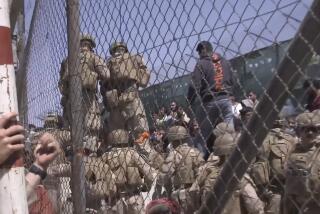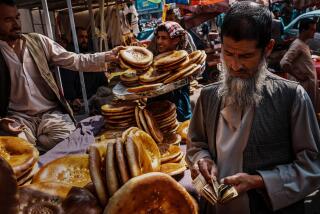Car bombing kills 16 in Kabul
KABUL, AFGHANISTAN — A car bomb hit an Italian military convoy on the main airport road near the U.S. Embassy in Kabul on Thursday, killing at least six soldiers and 10 Afghan civilians, Italian and Afghan government officials said.
The bombing, which wounded at least 52 people, was the latest in a string of attacks and showed militants’ ability to hit most corners of the troubled country at will.
It was the fourth major blast in the capital in five weeks.
Afghanistan’s Aug. 20 presidential election remains undecided as authorities attempt to sort out hundreds of allegations of fraud. In preliminary results, incumbent President Hamid Karzai has 54.6% of the vote and his main rival, former Foreign Minister Abdullah Abdullah, has 27.8%.
Witnesses said the attack by a white Toyota sedan took place as the military vehicles were caught in traffic.
Farhad Mallicki, 20, owner of a construction materials shop in front of the blast site, said he was waiting for a ride when he noticed a car following the Italian convoy. The soldiers seemed suspicious of the car but had little room to maneuver, he said. They slowed down to let it pass because they had little chance of outpacing it in the congestion.
Mallicki said that instead of going ahead, the driver squeezed between two of the military vehicles and detonated his explosives. Mallicki, who suffered a shrapnel wound to his arm, said that after the smoke and dust cleared he helped injured civilians into police cars bound for the hospital.
The area is near a Western diplomatic enclave and the road is frequently used by foreign troops. Last month, a suicide bomber blew up a vehicle outside the main gate of a military base used by North Atlantic Treaty Organization troops near the Kabul airport, killing several Afghans.
“This is the third attack I’ve experienced along this road in the last two years,” said Mallicki, who had not decided whether to relocate his shop. “With all these dead and wounded, look at how many lives are ruined.”
Zabiullah Mujahid, a spokesman for the Taliban movement, claimed responsibility in a text message to news organizations. He said a militant named Hayatullah had carried out the attack.
A diplomat based in Afghanistan who is familiar with suicide bomber tactics said the timing differed from previous attacks. Many car bombings in Kabul have taken place early in the morning, said the diplomat, who spoke on condition of anonymity. The would-be bomber is exhorted by handlers throughout the night, giving him little opportunity to back out, the diplomat said. The bomber is then taken to a recently purchased used vehicle packed with explosives.
This attack happened at midday, suggesting a far more motivated attacker, the diplomat said. It appeared to be aimed at a target of opportunity, the diplomat added, rather than specifically the Italians.
The deaths bring to 21 the number of Italians killed in Afghanistan, out of a force of about 2,800.
Italian Prime Minister Silvio Berlusconi said it would be best for international troops to leave Afghanistan soon, but there was no timetable and any decision would be made with his country’s allies.
Near the site of the attack, on a divided four-lane road, a row of shops made of earthen bricks and metal were badly damaged, with parts of the buildings sagging and most of the shops covered with dust and glass shards.
At least five damaged vehicles remained in the area, including one that had flown 20 feet off the road and landed on its roof. Bits of twisted metal and rubber littered the road at a distance of three football fields.
The vehicle used in the attack, reduced to little more than a blackened engine block, sat in the road about 100 feet away from the two heavily damaged military vehicles.
At one point, tempers flared between Italians and Afghan police, apparently over the removal of forensic evidence. After several minutes of shouting, part of a fender that had been placed in a truck was returned to the crime scene. Nearby, officials wearing purple gloves collected metal bits and body parts as hundreds of people watched from behind police tape.
Shah Mahmood, 33, who runs a tailor shop a few dozen feet from the blast site, said the attack was particularly disturbing because it came during the Muslim holy month of Ramadan.
“This is a barbaric, anti- Islamic act,” he said beside a sewing machine embedded with glass pieces. “Whoever did this is not even a human being.”
Shopkeepers and residents said the next president needs to make security the top priority.
Although Karzai is the front-runner, there’s growing international and domestic concern about the legitimacy of the election, given the suspected ballot-box stuffing, much of it in traditional Karzai strongholds.
In his first public remarks about the fraud allegations, the president said that he’d seen concrete reports of only 1,200 faked ballots and that he believes firmly in the integrity of the election.
European Union election monitors said that up to a quarter of the 5.6 million votes cast should be set aside pending an investigation. Final results aren’t likely until the United Nations-backed Electoral Complaints Commission can complete an inquiry, which probably will take weeks.
In a related development, a government commission said it had determined that 30 civilians and 69 Taliban militants were killed Sept. 4 during a German-ordered NATO airstrike on two hijacked fuel trucks in northern Afghanistan.
The attack occurred at a time when commanders are trying to reduce civilian casualties and the Obama administration is considering a further increase in troops. Karzai said Thursday that although the decision to mount an airstrike in an area where civilians were present was a mistake, Germany remained a “great friend” of his country.
--
Special correspondent M. Karim Faiez in Kabul contributed to this report.
More to Read
Sign up for Essential California
The most important California stories and recommendations in your inbox every morning.
You may occasionally receive promotional content from the Los Angeles Times.










